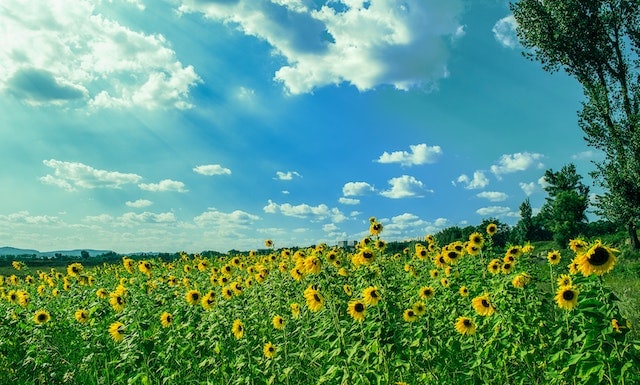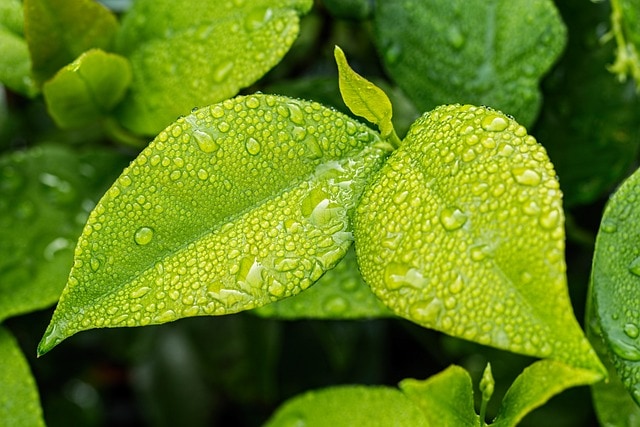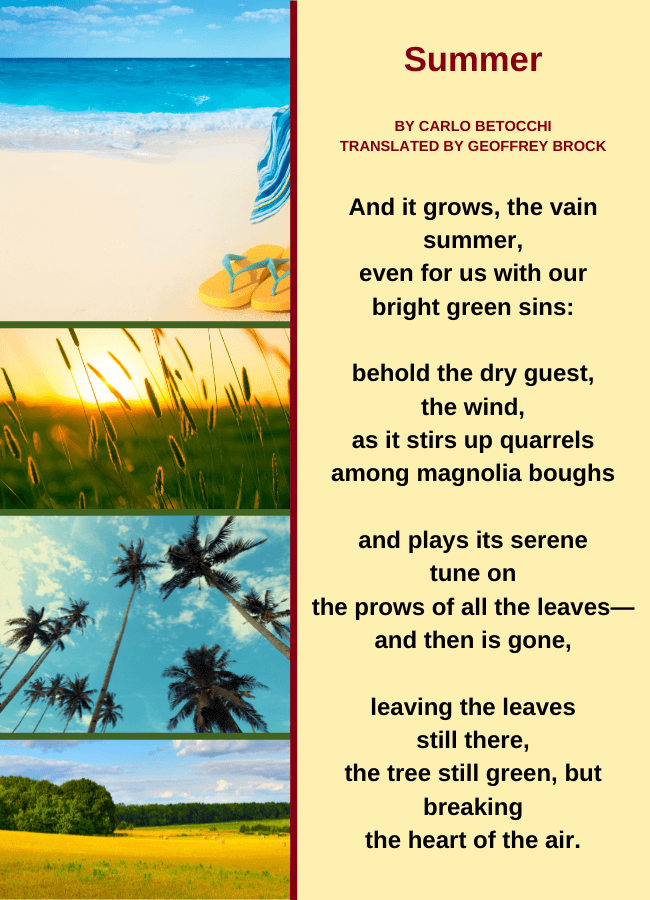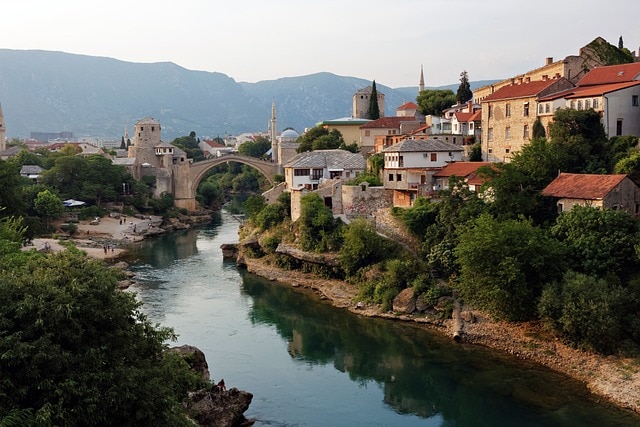
Table of Contents
The sun is up, the weather is warm, schools are closed and holiday destinations are beaming with life. Summer represents the peak of the year, characterized by warmth and abundant life. It is a time when nature is most active and vibrant. This season symbolizes growth and the high points in life, underscoring the significance of appreciating moments before they pass. Let’s take a look at the powerful symbols and symbolism of summer.
11 Powerful Symbols of Summer

Because of its purpose to bless nature, summertime is represented by numerous symbols, the majority of them revolving around plants and animals.
1. Ancient Germanic Symbol of Summer

This Germanic symbol, which is the representative sign of summer, is drawn to resemble a bowl. This is done intentionally to illustrate the earth as a bowl ready to receive the readily available warmth and energy of the sun.
2. The Sun
Does it get any more summery than the sun? Think of summer, and we immediately think of warm, sunny days of sunshine. The sun represents vitality, energy, and life. It’s the primary force behind summer’s warmth and growth.
3. Beach
Beaches evoke images of golden sands and gentle waves, symbolizing relaxation, leisure, and the boundless beauty of nature. And it’s during summertime that people tend to go to the beach the most. They are places of escape, where daily stresses melt away and where the horizon reminds us of life’s vast possibilities.
4. Sunflowers

The sunflower is the most obvious representation of summertime. Flourishing mostly in summer, sunflowers have a characteristic color that resembles the sun. What’s more, sunflowers are physically drawn to the sun, turning to face East in the morning, and moving with the positioning of the sun till they face West in the evening. Sunflowers, just like summertime, are a representation of youth and growth.
5. Fireflies
Fireflies are common in during summertime, bringing a beautiful fairy-light like warmth into your backyard. The enchanting dance of fireflies on a warm summer evening embodies magic, wonder, and transient moments of beauty. Their fleeting light reminds us of the ephemeral nature of life and the magic found in small moments.
6. Butterflies
Representing transformation, beauty, and freedom, butterflies are quintessential symbols of summer. Their delicate and colorful wings capture the fleeting and vibrant essence of the season. They flit around flowers and create honey during the season.
7. Salamanders

Salamanders are a symbol of summer because of their warm earthy colors that fit in well with the beauty of summer. There’s also an ancient Roman legend that claims that these creatures light fires and extinguish them at will. Additionally, they are a symbol of rebirth just like summer mainly because they are capable of regenerating their tail and toes.
8. Birds (especially migratory ones)
Birds like swallows and robins are often associated with the return of summer. Their songs and active presence stand for renewal, freedom, and the rhythm of life.
9. Cicadas
Known for their distinctive summer song, cicadas are a perfect symbol of summer because that’s when they tend to come out. They represent resurrection, immortality, and the fleeting nature of life, as some species emerge only after many years underground.
10. Green Leaves

If leaves with warm, earthy tones represent autumn, then green leaves are the best representation of nature during summer. The lush green foliage of summer represents life at its peak. Green leaves symbolize nature’s unstoppable force, resilience, and the cyclical nature of growth and renewal.
11. Barbecues/Grills
The sizzle of a grill and the smell of meat and vegetables on the barbecue is synonymous with summer gatherings. Barbecues represent community, celebration, and the joy of sharing meals. They embody the spirit of togetherness, as friends and family converge to share stories and laughter.
What Does Summer Symbolize?

While there are many symbols that represent summer, summer itself is symbolic of many deep concepts. Here are some of the most well-known.
- Growth: In summer, plants reach their height and animals born in spring grow quickly. It’s a time when nature is full of life.
- Maturity: Think of summer as the prime time of life. It’s when people often feel at their best and most confident, strong, and hopeful.
- Warmth: It goes without saying that summer is associated with warmth. Summer is basically the warmest season of the year with the sun high up and days longer than nights.
- Adventure: This is the season when schools are closed and holiday destinations are the busiest. There is a sense of adventure in the air.
- Nourishment: The summer sun doesn’t just warm us; it feeds the plants and, in a way, boosts our spirits too.
Summer Symbolism in Literature and Music

The summer season is usually incorporated in literature to symbolize joy, adventure, fullness, self–acceptance, and the search for love. Examples of literary pieces that mention summer include Ann Brashares’s The Sisterhood of the Travelling Pants; Linda Hull’s Insects of Florida, and Denyque’s song Summer Love, just to mention a few.
There are also many poems about summer, celebrating the beauty, warmth, and growth that comes with the season.

Folklore and Festivals of Summer

As a season that almost everyone looks forward to, summer has held an important place throughout history.
In ancient Greek, summer marked the beginning of a new year and the beginning of preparation for the highly celebrated Olympic games. It was also during this time that the festival of Kronia, honoring Cronus, was held. During this celebration, Greek’s otherwise strict social code was disregarded and slaves were served by their masters.
The Medieval Chinese associated summer with “yin” the feminine force of the earth. Festivals such as “the lantern festivals” are held in honor of yin.
Ancient Germans, Celtics, and Slavic people celebrated summer with bonfires, which they believed had the power to enhance the sun’s energy and assure a good harvest. The bonfires were also believed to banish evil spirits who were alleged to be strongest in the summertime.
The Ancient Egyptians, Indians, Sumerians, and Akkadians all celebrated the sun as a god who brought forth not only light but also life and nourishment. In fact, in Egypt, Ra the sun god was the dominant one of all gods.
Wrapping Up
In any culture, summer is a time that is bursting with energy and life. As such, summer has come to represent optimism, positivity, hope for the future, and joy. Unlike winter, which signals the end, autumn, which harks the beginning of the end, and spring, which symbolizes the start of a new beginning, summer represents life and endless opportunities that await.
Related articles
Spring: Powerful Symbols and Symbolism of the Season
Winter Symbols and Symbolism to Celebrate the Cold Season
Autumn (Fall): Powerful Symbols and Symbolism
Baldur – Norse God of the Summer Sun








